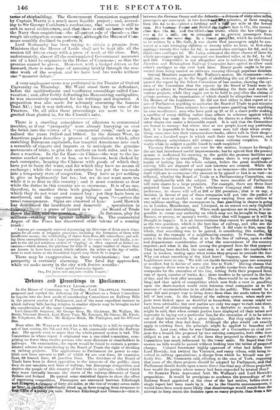There is a startling coincidence of allusions to commercial troubles,
as if our " prosperity" were already hurrying us over the brink into the vortex of a " commercial crisis,' such as sig- nalized the years 1825-6 and 1835-6. In the distant West, an American paper describes a process of speculation which, after enriching European capitalists, has tempted Americans into such a scramble of exports and imports as to anticipate the genuine movements of trade, to glut the markets on both sides, and to in- duce a reaction. In the far East—in China—the way to the im- mense market opened to us has, as we foresaw, been choked by rash enterprise, heaping the Chinese with goods of which they have yet to learn the want, and for which they have no means of exchange ; while the same rash enterprise has put the tea-trade into a temporary, state of congestion. They have as yet nothing to give us legitimately but tea ; but we do not want more tea while it is so dear in this country ; and it must continue as dear while the duties in this country are so enormous. It is of no use, therefore, to smother them with ginghams and broad-cloths, which they do not want and cannot buy : yet they have been so smothered, and the exporters may bring upon themselves the usual consequences. Signs are observed at home Lord Howick
lute de heed the inordinate and demoeali- speculation in 1.; - a game of hazard in o the Board of Trade
throw the isrthc-gareae-- 4,e fortunes, play for Millions—staking- ruin against in . The commercial Argus of the Times has discovered other tokens of a coining crash : " Letters are constantly received denouncing the Directors of Joint-stock Com- panies for all sorts of irregular practices • including the formation of them with insufficient means; the withholding of shares from bona fide subscribers, and sell- ing them surreptitiously at a large premium at the same time; and finally, a re- sort to the old and nefarious system of ' rigging,' so often exposed on former oc- casions,—which means, the purchase for time of a larger number of shares than are known to have been issued, which subjects the sellers on the day of settle- ment to such terms as the fraudulent buyers may think fit to impose."
There may be exaggeration in these vaticinations ; but our prosperity is certainly alarming. The fatal day approaches, while we make merry in the city with festive wreaths :
" Fatis aperit Cassandra futuris Ora, Dei jussu non unquam credita Teucris."


























 Previous page
Previous page